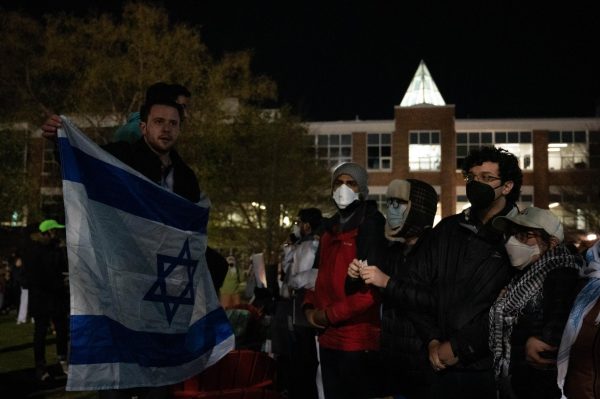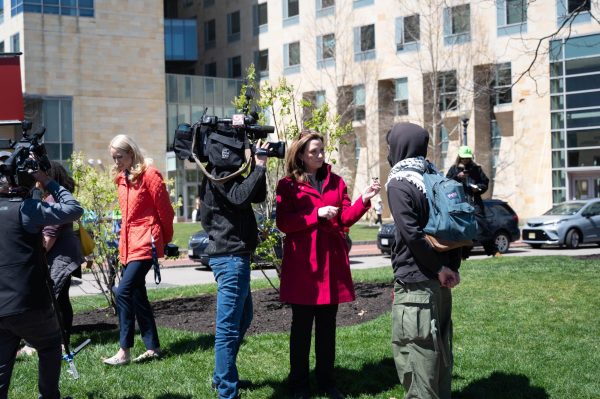Students approve of first-year dismissals, but not financial penalties
September 23, 2020
In a decision that students have called “rushed,” “severe” and showing “zero-tolerance,” Northeastern announced Sept. 4 that it would dismiss 11 first-year students in the N.U.in Boston program caught violating social distancing guidelines.
N.U.in staff found the students gathering in a room at the Westin Hotel the night of Sept. 2, an infringement of safety protocols set in Northeastern’s Guide to Residence Hall Living, which prohibits guests in assigned on-campus bedspaces, including those who live within the same building. The university gave the first-years 24 hours to vacate the hotel after undergoing a COVID-19 test. The students are not allowed to take their fall semester courses online, and they initially were not going to be refunded the $36,500 tuition they already paid for the N.U.in program.
Following the students’ appeals process, the university announced in a statement Sept. 17 that while it would be sustaining the original penalty, including the loss of tuition, room and board, it reserved the right to alter the sanction. The 11 dismissed students will be credited their fall tuition towards the spring semester at Northeastern, but will not receive credit for their room and board charge of $8,740.
As news of the dismissals reached national media, students on campus felt Northeastern’s decision to dismiss the 11 students, one of the largest steps among universities nationwide to discourage defiance of COVID-19 safety guidelines, was shocking. A majority of students who spoke with The News said they believed that while the dismissal of these students was justified to protect the campus community, the initial decision to not give back the tuition was not, especially given that the fall semester had not yet begun.
“[Northeastern] did put out multiple warnings that they were going to suspend students if they had gatherings in their rooms, so it was kind of expected,” said Bill Wohlers, a second-year computer science major.
Nathan Wu, a second-year business administration major with a concentration in finance, said that although the university’s decision was strict, it was warranted.
“I think the decision to credit the tuition balances out the financial burden of the punishment and Northeastern did make the right decision because the rules were very clear and the students violated them,” he said. “We’re in a global pandemic, so I believe it’s risking other lives, or at least the lives of the other N.U.in students in Boston.”
Marty Sullaway, a first-year electrical and computer engineering major, saw the university’s appeals decision as a way to avoid negative headlines.
“I think Northeastern was trying to make a point by kicking them out, but now they’ve backed off because they were afraid of bad PR,” Sullaway said. “In my opinion, the whole thing was mishandled publicly. They should have given them their money back to begin with.”
The dismissals sparked debate among students on the stringent measures the university has taken to prevent the spread of COVID-19. Wohlers said he believes the gathering itself resulted from stern university protocols.
“As a freshman, it has to be tough to meet new people now,” Wohlers said. “Obviously no one can have the true college experience given what’s going on, but I think Northeastern’s rules are a bit strict given that it has a very advanced testing system in place and students are already taking lots of precautions.”
Beginning freshman year during a pandemic has created unprecedented circumstances for first-year students on campus, said James Smalley, a second-year chemical engineering major.
“In an ideal world, these students really shouldn’t have been put in the place they were in,” Smalley said. “They’re freshmen, and at the end of the day the university didn’t open enough common areas right away for them to hang out and they didn’t have enough social offerings to meet people.”
According to Jessica Hair, a spokesperson for the Northeastern Media Relations department, Residential Life is looking to help freshmen meet one another by hosting a variety of events, including in-person N.U.in seminars and excursions for students to explore New England with other N.U.in students. Specifically at the Westin Hotel, the N.U. in staff have worked closely with staff at the hotel to identify more spaces where students can study and socialize together.
“Residential Life is continuing to have one-on-one conversations with students to reinforce and educate students on COVID policies and also reminding students how communities can still connect, how RAs remain a resource, and how students can get involved through clubs and organizations,” Hair said in an email to the News.
Caroline Lidz, a first-year media arts and communications studies major in the N.U.in program, said while the dismissals were needed to keep the community safe, “acting so aggressively has created tons of anxiety and fear within the students living in the Westin.” She cited a “lack of visibility” felt by N.U.in students living in the hotel a mile from campus, due to the general lack of clarity about university rules that has led to confusion and anxiety about breaking guidelines they don’t know exist.
“It’s not necessarily a conversation amongst students and staff about what the exact rules are, it’s more of, you better not break a rule that you may or may not know about,” she said.
Hair said that the university has made their guidelines explicitly clear.
“The university’s expectations regarding unsafe gatherings, and other COVID-19 related policies and protocols, were consistently and clearly communicated to the students in the following documents: Student Attestation Form; the N.U.in Program Supplemental Guide to Participant Conduct; the Guide to Residence Hall Living; and the university’s Reopening website.”
Northeastern’s stern warning against violating safety guidelines has caused students like Katie Polum, an undeclared first-year student studying in the College of Engineering, to reconsider their actions when socializing.
“I don’t even want to be seen with a group of eight or more people, even if we’re six feet apart,” she said. “I just don’t think it’s worth it to associate with any type of behavior that could be seen as violating the guidelines.”
Some students like Lidz saw Northeastern’s decision as a “display of power,” and Wu added the dismissals made the consequences for disregarding protocols extremely clear.
“I think it made students aware that Northeastern will do what they have to do if people violate the rules,” he said.
Smalley said he fears what the long-term consequences of such a severe punishment from the university could have on campus life.
“Some students now fear that they might have to be looking over their shoulders for people who might report them to the university,” he said. “To me, that creates a loss of community.”
Smalley said that the university needs to strike a balance between building a community and keeping everyone safe by communicating with students directly.
“I think the university admins need to talk with students to get a grasp of how the students are feeling, whether that’s creating a student council to talk about restrictions or maybe polling students on how they feel about certain restrictions,” he said.
Lidz said more needs to be done to actively foster dialogue between students and the university.
“We’re thinking that the university is going to spare no expense and no student in making sure that they’re the first college to open successfully,” Lidz said. “It’s a valiant effort and a great goal, but I think in achieving that goal they’re compromising what the college experience really is.”


















